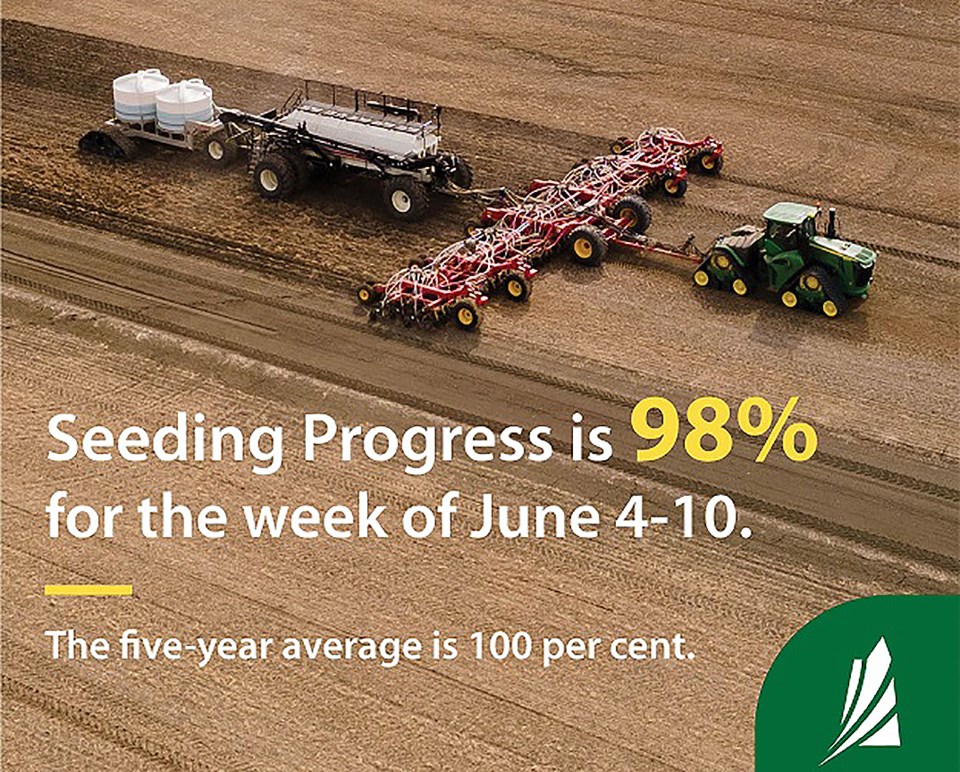SASKATCHEWAN — Provincially, most producers have completed their seeding operations with 98 per cent of the 2024 crop seeded. Rain continued to hinder seeding operations in the northeast and east-central parts of the province. Some producers have indicated their acres may not be able to be seeded this year due to the excess moisture in some areas.
Rain fell throughout the province over the last week with the northeast region receiving the highest amounts. The Lake Lenore area reported the highest rainfall amount at 81 mm followed by the Arborfield area at 78 mm and the Duck Lake area at 76 mm. Regions that have received increased precipitation have noted that the heavy rainfall has caused water to collect in lower lying areas with crop flooding occurring.
With the continued rainfall across the province, moisture conditions continue to increase with a few more regions indicating surplus moisture. Cropland topsoil moisture is rated as eight per cent surplus, 90 per cent adequate and two per cent short. Hayland topsoil moisture is reported at five per cent surplus, 89 per cent adequate and six per cent short. Pasture topsoil moisture is five per cent surplus, 87 per cent adequate and eight per cent short.
Although many crops fall within the normal stages of development for this time of year, there has been a week over week increase to the percentage of crops reported as behind the normal stages of development due to the cooler temperatures experienced and delays to seeding from rainfall. Spring wheat and oilseed crops are the furthest behind the normal stages of development for this time of the year.
Many producers indicate that pasture conditions have shown great improvement throughout the province given the moisture received. The majority of crops across the province are reported in good to excellent condition given the moisture received. This has provided a great start for crops as compared to previous years.
Of the cereal crops grown across the province, winter wheat is reported at 69 per cent good and 18 per cent excellent. Fall rye is 73 per cent good and 14 per cent excellent. Spring wheat is 64 per cent good and 23 per cent excellent. Durum is 66 per cent good and 27 per cent excellent. Oats are rated as 68 per cent good and 19 per cent excellent. Barley is 66 per cent good and 21 per cent excellent. Triticale is 83 per cent good and 13 per cent excellent. Canary seed is rated at 65 per cent good and 24 per cent excellent.
Provincially, field peas are rated as 67 per cent good and 24 per cent excellent. Lentils are 69 per cent good and 21 per cent excellent. Soybeans are 73 per cent good and 10 per cent excellent. Chickpeas are 84 per cent good and 11 per cent excellent across the province.
Across the province, flax is rated as 68 per cent good and 23 per cent excellent. Mustard is 71 per cent good and 17 per cent excellent. Canola shows to have a wider range of reported crop condition with 16 per cent excellent, 62 per cent good and 19 per cent rated as fair.
Environmental conditions contributing to crop damage this week include excessive moisture, frost and wind. Damage overall was reported as minor except for a few areas of the province reporting increased crop damage from wind and excessive moisture. In addition to damage caused by crop flooding in low lying areas from excessive moisture, producers also note that crops are showing signs of stress due to the excess moisture in some regions of the province. Flea beetles, grasshoppers and gophers continue to cause crop damage throughout many regions with some areas reporting minor to moderate crop damage.
As producers wrap up seeding, they are applying in-crop herbicides during appropriate weather, as well as rock picking. Crops will continue to be monitored for insects and environmental damage. As cattle are moved out to pasture, producers will monitor and fix fence where required. For many producers, this is still a stressful time of year and producers are encouraged to take safety precautions in all the work they do. The Farm Stress Line can help by providing support for producers toll free at 1-800-667-4442.





